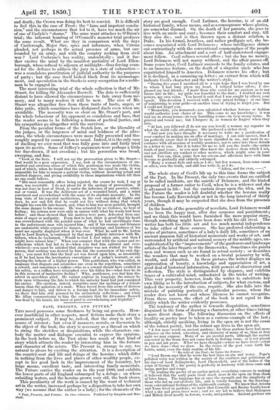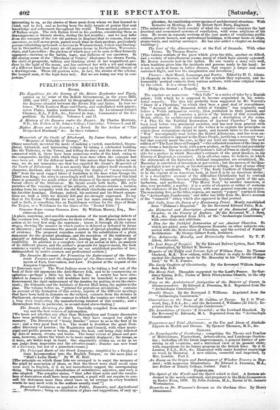PAST, PRESENT, AND FUTURE. * Tnis novel possesses some freshness by
being sui generis. How- ever inartificial in other respects, most fictions make their story a prominent subject. It may be, indeed, that the story is not the source of interest ; but even if manners, morals, or discussion be the object of the book, the story is necessary as a thread on which to string the sketches or disquisitions, while the characters em- body the matter and dialogue essential to express the opinions. In the book before us, the Past alone has much of that kind of story which attracts the reader by interesting him in the fortune and character of the actors. The Present is, strange to say, too natural to please by exciting the attention. It is a description of the country-seat and life and doings of the heroine ; which differ in nothing from the lives and places of other wealthy people, ex- cept in her good luck in the improvement of the tenantry, her large means, excellent taste, and interesting family memorials. The Future carries the reader on to the year 1880, and exhibits the lower parts of old England submerged by a deluge ; on whose subsiding waters, and the heroine grown very old, the book closes.
This peculiarity of the work is caused by the want of technical art in the writer, increased perhaps by a disposition to take her own wny (we assume that the author is a lady) ; for the elements of the
* Past, Present, and Future. In two volumes. Published by Simpidn and Mar- story are good enough. Cecil Latimer, the heroine, is of an old historical family, whose means, and as a consequence whose glories, are somewhat dimmed. On the death of her parents, she goes to live with an uncle and aunt ; becomes their comfort and stay, till they also the ; and is then thrown upon a distant relation, a Duke. In his formal, heartless, and rather profligate set, she be- comes acquainted with Lord Delamere ; whose intelligence shines out contrastingly with the conventional commonplace of the people about him. An attachment and a sort of half-understood engage- ment follow. Cecil refuses several offers ; but she has no money, Lord Delamere will not marry without, and the affair passes off. Some years later, Cecil Latimer succeeds to the family estates, and to an immense fortune, on the death of a singular uncle who has expatriated himself to America. Delamere renews his offer ; but it is declined, in a summing-up letter ; an extract from which will indicate Cecil's character and the writer's style. "During five years I sacrificed all to a vain hope that I was loved by one to whom I had long given my heart. I refused better offers ; I dis- pleased my best friends ; I made those who cared for me anxious as to my future fate in life ; my pride was humbled to the dust ; I doubted my own powers, my own value. You heard it said that I was sought by others, your- equals. 'This devotion I received with a very mixed feeling ; at one time of ministering to your pride—at another time of trying to forget you. But I could not forget you. "Meanwhile, you demurred—you calculated whether fortune or fashion would authorize your choice of me. This came to my knowledge ; it was told me in strong terms—in very humbling terms—in very strong terms. It grieved and vexed me; but I forgave it, as women do forgive when they- love.
"At last, you followed (I do not say you loved) a woman my superior in what the world calls advantages. She preferred a richer rival. "And now you have thought it necessary to write me a justification of your conduct in making me an offer of marriage. I can only answer, that I am perfectly aware that it would be more dignified in me, and more in ac- cordance with all maxims of worldly prudence, not to enter into these details in a letter to you. But it is better for me to tell you the truth—the entire truth of past years ; as you may thus know the motives from which I act, and not attribute my conduct to other motives, which might arise in your mind. You can, then, judge how my esteem and affections have with time become so gradually and entirely estranged.
" Many a woman feels and acts as I do ; but few women, from some cause or other, own the truth, and still less write it, as I do. "Adieu, and for ever, —."
The whole story of Cecil's life up to this time forms the subject of the Past. In the Present, the only two events that are entitled to be called incidents, are the suicide of Delamere, and the hinted proposal of a former suitor to Cecil, when he is a widower and she is advanced in life : but the curtain drops upon the idea, and in the Future the reader is left doubtful whether the heroine really has become Lady Ravensleigh or not in the long interval of thirty years, though it may be suspected that she does from the presence of children.
In the hands of the generality of novelists, Lord Delamere would have been the happy man, after due suspense and punishment ; and we think this would have furnished the more popular story,, though something might have been done with his old rival. The writer has both too little art and too much mental independence to take either of these courses. She has preferred elaborating a series of pictures, sometimes of a lady'a daily life, sometimes of an ancient mansion full of historical memorials and works of art, and surrounded by artificial and natural scenery of the middle ages, un- sophisticated by the "improvements" of the gardeners and landscape artists of the later Stuarts or the Brunswicks. Sometimes she paints men and women such as are found in actual society ; or describes the wonders that may be worked on a brutal peasantry by will, wealth, and education. In these pictures the writer displays an appreciation of beauty, a knowledge and appreciation of art, a good deal of historical information, with powers of observation and reflection. The style is distinguished by elegance, and exhibits traces of a cultivated mind, unhacknied in the tricks of writing. This very property, however, leads the writer to substitute her own liking as to the introduction of subjects, for what custom, and indeed the necessity of the case, require. She also falls into the mistake of painting portraits of particular persons, whom the reader does not know and whose likeness he cannot recognize. From these causes, the effect of the book is not equal to the ability which the writer evidently possesses. The tendency of the author is towards disquisition, sometimes disguised in the form of drawing a character, at other &nes taking a more direct shape. The following discussion on the effects of locality on poetry may be taken as a curious example of the last ; although, strictly speaking, living in the open air is not the cause of the robust poetry, but the robust age lives in the open air. "A few more words on ancient gardens ; for these gardens have had more influence on the mind, education, and character of many of us, than at first sight we may suppose. Many of us are mental poets, although the matter concocted in the brain does not come forth in flowing verse, or is not placed in pen and ink prose. What we have thought—where we have lived—what we have done—that we show. In the verses of the poet come forth his habits, mind, even the daily routine of his life. " ' He tells of the Past—he forms the Future.'
"Lord Byron says that he wrote his best lines on gin and water. Pope's polished verse was written in the society of the courtiers and politicians of his day—of Lord Bolingbroke Lord Chesterfield, and of the ladies of the reign of George H. ; his poetry is perfectly in harmony with dress coats and hoops, patches and rouge.
"In reading the poetry of an earlier period, everything concurs in making it believed that the early poets lived much more in the open air than those of later times. The language has at once the strength and the simplicity of those who led an out-of-doors life, and is totally wanting in the drawing- room conventional feelings of the eighteenth century. We know that Ariosta and Tasso lived in gardens ; we know that Corneille and Racine hardly knew what a sky and green trees were ; and we are led to believe that Shakspere and Milton lived mostly in forests, woods, and gardens. Ancient gardens are interesting to us, as the abodes of these pada from whom we first learned to think and to feel, and as having been the daily haunts of genius that sent knoWledge and refinement throughout the world. These ancient gardens are of Italian origin. The rich Italian lived in his gardens, considering-them as iliawingrooms.or literary Abodes, during the teat -months ; and we may infer tfrom -the remains of the. few old gardensin England that do remain, that our .ancestors, as well as aur poets, passed-much lime in their gardens, particularly parsons hiliallitingepotssuch as,Levensin Westmoreland, Cohele.aruiDartMg- ton in Devonshire,and many an Old manor-house in Derbyshire, Worcester- Aire, and Lancashire; thegardens of -which may yet be seen artherformerly aw.mred—showing us the habits, -taste, and fashions of our ancestors. in .t,ialcaingsseesse of the 'Merchant of Sindamere has shown Portia, the child.of,prospeeity, talking and thinking aloud in her magnificent gar- dens by the light of the moon, and has endowed her with a wit and wisdom of a different kind from that of the lady cooped up in the artificial climate of a drawiegroorn. These -old gardens were, in fact, the abodes of the scholar, the learned man, or the high-born lady. But we are losing our way in-con- jecture."



























 Previous page
Previous page